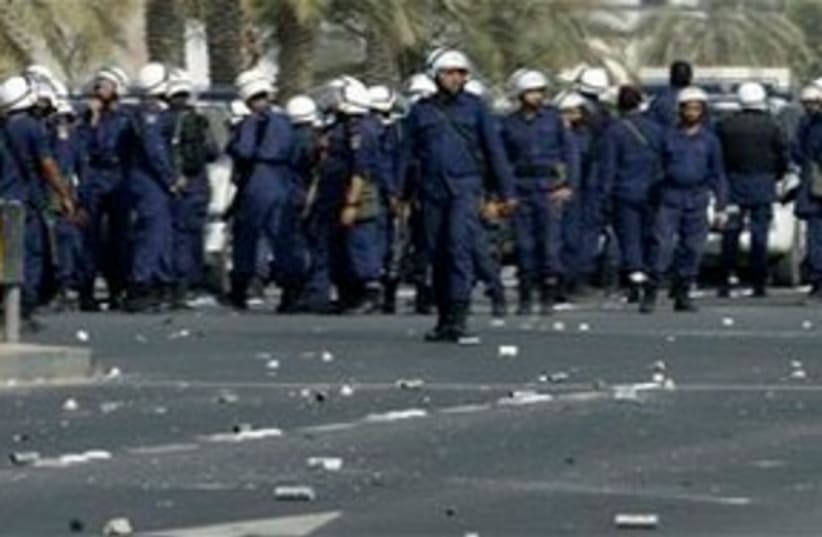Violence erupts during anti-government protests in Iraq
50 armored vehicles roll into Bahrain capital square The developments marked a major crackdown by the island nation's rulers to put an end to days of protests inspired by Egypt's revolt against Hosni Mubarak. Tiny Bahrain is a pillar of Washington's military framework in the region. It hosts the US Navy's 5th Fleet, which is a critical counterbalance to Iran's efforts to expand its clout in the region.The capital Manama was effectively shut down Thursday. For the first time, tanks and military checkpoints were deployed in the streets and army patrols circulated. The Interior Ministry warned Bahrainis to stay off the streets. Banks and other key institutions did not open, and workers stayed home, unable or to afraid to pass through checkpoints to get to their jobs.Barbed wire and police cars with flashing blue lights encircled Pearl Square, the site of anti-government rallies since Monday. Police cleaned up flattened protest tents and trampled banners inside the square, littered with broken glass, tear gas canisters and debris. A body covered in a white sheet lay in a pool of blood on the side of a road about 20 yards (meters) from the landmark square.Demonstrators had been camping out for days around the square's 300-foot (90-meter) monument featuring a giant pearl, making it the nerve center of the first anti-government protests to reach the Arab Gulf since the uprisings in Tunisia and Egypt.The protesters' demands have two main objectives: force the ruling Sunni monarchy to give up its control over top government posts and all critical decisions, and address deep grievances held by the country's majority Shiites who claim they face systematic discrimination and are effectively blocked from key roles in public service and the military.But among Bahrain's rulers, the prospect of a prolonged crisis raised fears of a potential flashpoint between Iran and its Arab rivals in the Gulf. Bahrain's ruling Sunni dynasty is closely allied to Saudi Arabia and the other Arab regimes in the Gulf. Shiite hard-liners in Iran have often expressed kinship and support for Bahrain's Shi'ite majority, which accounts for 70 percent of the island's 500,000 citizens.The police assault came early Thursday with little warning. Mahmoud Mansouri, a protester, said police surrounded the camp and then quickly moved in."They were beating me so hard I could no longer see. There was so much blood running from my head," he said. "I was yelling, 'I'm a doctor. I'm a doctor.' But they didn't stop."He said the police beating him spoke Urdu, the main language of Pakistan. A pillar of the protest demands is to end the Sunni regime's practice of giving citizenship to other Sunnis from around the region to try to offset the demographic strength of Shiites. Many of the new Bahrainis are given security posts.Al-Ikri said he and others on the bus were left on a highway overpass, but the beatings didn't stop. Eventually, the doctor said he fainted but could hear another police official say in Arabic: "Stop beating him. He's dead. We should just leave him here."Bahrain's parliament — minus opposition lawmakers who are staging a boycott — met in emergency session. One pro-government member, Jamila Salman, broke into tears.Before the attack on the square, protesters had called for major rallies after Friday prayers. The reported deaths, however, could become a fresh rallying point. Thousands of mourners had turned out for the funeral processions of two other people killed in the protests earlier in the week.Monday's bloodshed brought embarrassing rebukes from allies such as Britain and the United States. A statement from Bahrain's Interior Ministry said suspects have been "placed in custody" in connection with the two deaths but gave no further details.
